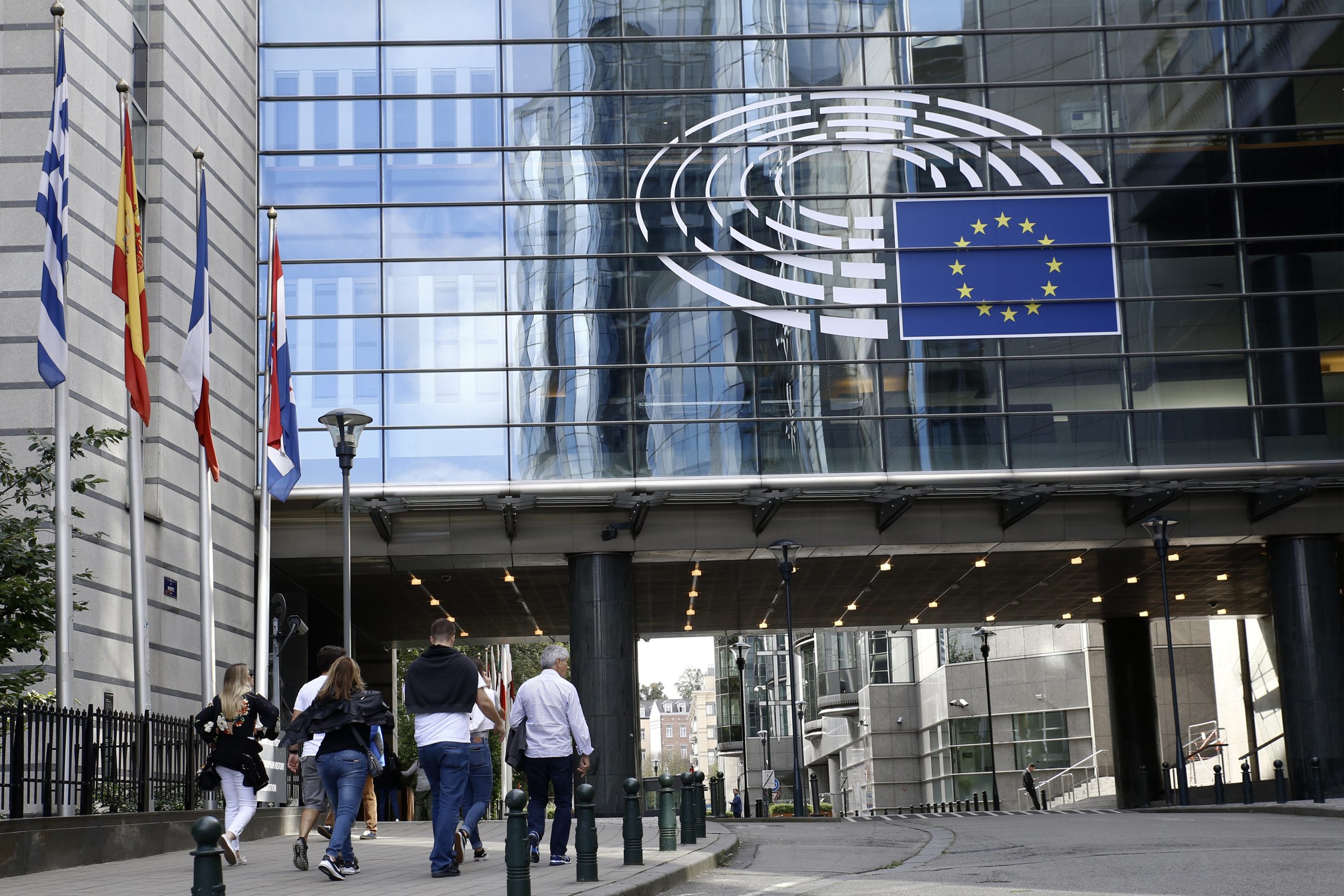Would Giving up Ukraine Be an Impermissible Strategic Blunder?
At a summertime international conference in Krakow I talked with a reporter from the publication The American Conservative, who remarked confidently: “My friends, you [i.e. Europeans] should take care of the security of Ukraine yourselves.” Despite various counter-arguments, he maintained his original view on the issue. In this post, I am considering why “surrendering” Ukraine would be a strategic decision from a US constitutional law perspective.
As of today, China and not Russia, represents the greatest geopolitical threat to the foreign policy tasks facing the United States, in the eyes of both the political establishment and ordinary citizens. The China-threat is seemingly mainly manifested in the economic realm, however, it is tangible in every other (e.g. military, science, innovation, etc.) sense. China is continuously expanding its spheres of influence in different parts of the world and trying to replace the USA as a world military hegemon.
However, in the process of considering China as the main geopolitical opponent of the USA, representatives of both the Republican and Democratic parties make a common mistake. Declining Russia’s role completely and trying to divert attention from it is more than a strategic error. Regardless of the results of the ongoing war in Ukraine, we should not expect an empty hole to appear on the territory of Russia. At the same time, the fate of America’s decades-long allies, with which Russia is still trying to expand its spheres of influence, shouldn’t be forgotten.
On the evening of August 23, 2023, a Republican Party debate was held in Milwaukee, Wisconsin. One of the candidates, businessman Vivek Ramaswamy made provocative remarks regarding the discontinuation of aid to Ukraine. This prompted a pointed retort from former American Ambassador to the United Nations and fellow candidate, Nikki Haley, who stated: “You’re choosing a murderer (Putin) over a pro-American country.” Candidate Haley, who has significant foreign policy experience compared to Candidate Ramaswamy, pointed out that strengthening Russia will lead to the automatic rise of China. This is a national security threat to the United States – and not just to the United States. It must be said that former Vice President, current Presidential Candidate Mike Pence has a similar position about the threats from China and Russia and about the directions of the US foreign policy.
However, the rating of both Haley and Pence is quite low compared to Florida Governor Ron DeSantis – who does not make harsh statements about this issue. DeSantis – strategically avoiding talking about foreign policy – focuses on domestic issues such as school choices and gender ideology. Interestingly, he takes the second position in the ratings, which indicates that Americans are more interested in domestic issues than in foreign policy questions. Here, it should be mentioned that former president Donald Trump – who announced his intention of running for presidency again in 2024 – is also quite vague on the war. President Trump has indicated that he would end the war – although he did not detail his plans on how he envisions this.
On 21 September,a group of Congress Republicans sent a letter to the White House Office of Management and Budget (OMB) on the response of the White House’s request for the appropriations for direct military aid, economic and humanitarian assistance for Ukraine, to defend itself against Russian aggression. One of the most important parts of this letter was the question: “What is our strategy, and what is the president’s exit plan?” The key element of this letter was financial transparency, but the reluctance to deter Russia in Ukraine for a certain group of Republican circles is quite clear there.
Under Section 2, Article II of the Constitution of the United States, the President makes treaties, appoints ambassadors, and is Commander in Chief of the Army and Navy, meaning he/she is the High Representative in foreign affairs. Therefore, the President is responsible for identifying foreign threats. That was how the executive branch had acted in most cases during and after the Cold War, when the violent will of expansion was expressed by certain countries, such as the Soviet Union against the Eastern Bloc, Iraq against Kuwait, etc. The most significant reasons were to deter their expansion and give an example to other autocrats not to interfere with peaceful regions and free people.
But now, seen from Eastern Europe, from Georgia, the attitude of the top-ranking US presidential Republican nominees towards Russia’s war in Ukraine appears to be shocking. Why? Because they consider it only as a European security issue and not as a geopolitical threat risking Western values and the current Western-led status quo in the global realm. For Eastern Europeans, who have historically depended on the United States’ alliance, this represents a troubling indication that the American public may be growing increasingly fatigued and preoccupied with domestic issues, diminishing the allure of foreign policy initiatives.
Also, the Budapest Memorandum of 1994, which gave a clear security guarantee to Ukraine, is also paid little attention to these days. Article 2 of that Memorandum sets forth that “The United States of America, the Russian Federation, and the United Kingdom of Great Britain and Northern Ireland, reaffirm their obligation to refrain from the threat or use of force against the territorial integrity or political independence of Ukraine.” Remember, that an international agreement was made for giving up nuclear non-proliferation by Ukraine, which would have been a real security capability in the current situation.
The idea of the American system is established on popular sovereignty, which guarantees the participation of each part of society in the political process, which also impacts foreign policy issues. The citizens who are a majority of the electorate have always had a negative attitude towards war and instability, with a large part of them looking skeptically at the foreign activity of America even in the period after the Second World War, when in February-March 1952, the majority of Americans said it was a “mistake” for the U.S. to be involved in the Korean War. A large part of them was also uncertain about foreign interference after the collapse of the Soviet Union, too.
The Russian nostalgia for Soviet times and their military presence in Eastern Europe is also noteworthy. New versions of Russian history books, which are directly supervised by Mr. Putin, show how regretful they are about the peaceful withdrawal of the Soviet army from Prague, Budapest, and Warsaw and how much they blame Gen. Secretary Gorbachev’s entire reforms from the late 1980s. That is the reason why the Russian state-owned televisions declare those Eastern European countries as the most unfriendly ones, along with the United States, even now.
I think this situation is not so unusual, however, as of today, the United States cannot afford to be passive in the current and burning foreign policy dynamics, as it may face an unprecedented geopolitical threat by losing its Eurasian spheres of influence.
As former Secretary of State Henry Kissinger pointed out in his seminal work, World Order, if Europe and the US begin to strategically separate from each other, we may see the US reduced to a mere regional power. To the extent that Ukraine today clearly represents the first line for the defense of Europe, the US skepticism towards Ukraine within the context of the ongoing war should be considered as a withdrawal from the affairs of Europe as well, pointing towards a more and more isolationist stance, not unfamiliar in American foreign affairs.
At the same time, we should not forget the attempts to kick out the USA from different regions of Eurasia, such as Eastern Europe, Caucasus, Middle East, are orchestrated by the cooperation of China and Russia. If we also remember another career diplomat and academic, Zbigniew Brzezinski, serious threats to America as a world power will begin if several regional states of Eurasia are able to unite against it. According to Politico, China supports Russia’s aspirations both with equipment and with the operation of Chinese companies in Russia. Those companies pay substantial taxes to the Russian budget. Additionally, Russia acquires weapons from Iran as well.
I am far from the opinion that Russia can become a unifier of the interests of Iran and China against the United States, such a state is more China, however, ignoring and being indifferent to the consequences of the ongoing war in Ukraine strengthens the Russian-Chinese alliance, and if we look at China’s actions, it is a fact that Russia’s victory should be considered as a victory for China. As the President of the Hudson Institute, John. P. Walker said, “US victory is essential for generating support for Taiwan at home. […] if the US winds down mere security assistance for Ukraine, state we recognize, how can the public expect to shed blood for Taiwan, which our policy considers a part of China? Mostly likely, isolationism will blossom.”
With those examples, I would remind the Western powers and especially the United States and its decision-makers that Russians still have an ambition of taking over and controlling Eastern and Central Europe, and showing a weakness to them has never been a solution.
Giorgi Labadze obtained an MA in American Studies and currently is a Ph.D. candidate in the same field, lecturing at Tbilisi State University, and teaching at the American International High School in Tbilisi, Georgia.His major interests are the emergence of nationalism in Europe and in the United States, the intersections of public law and politics as well as foreign policy. Email: giorgi.labadze@tsu.ge








